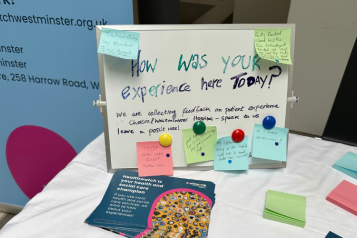Advice about mpox

There are two major types or ‘clades’ of mpox, known as clade 1 and clade 2. Clade 2 mpox, which appears to be a less severe strain, has been present in the UK since 2022, however only a small number of people in the UK have had mpox .
Clade 1 mpox has previously only been reported in five countries in central Africa but there is now increasing transmission of Clade 1 mpox in several countries in east and central Africa.
There are currently no confirmed cases of clade 1 in London, or anywhere else in the UK. Therefore the overall risk to people living here remains low. However if you have recently travelled to the affected countries please be aware of signs and symptoms and contact NHS 111 for advice if you have any concerns.
How do you get mpox?
Mpox can be passed on from person to person through:
- any close physical contact with mpox blisters or scabs (including during sexual contact, kissing, cuddling or holding hands)
- touching clothing, bedding or towels used by someone with mpox
- the coughs or sneezes of a person with mpox when they're close to you
In parts of central and east Africa, mpox can also be caught from infected rodents (such as rats, mice and squirrels) if:
- you're bitten
- you touch their fur, skin, blood, body fluids, spots, blisters or scabs
- you eat their meat and it has not been cooked thoroughly
Currently most cases of clade 2 in the UK have been in men who are gay, bisexual or have sex with other men, so it’s particularly important to be aware of the symptoms if you’re in these groups.
Find out more on the UK Health Security Agency website.
What are the symptoms
The symptoms of mpox include:
- A skin rash with blisters, spots or ulcers that can appear anywhere on your body (including your genitals)
- Fever
- Headaches, backache, and muscle aches
- Joint pains
- Swollen glands
- Shivering (chills) and exhaustion
A rash usually appears 1 to 5 days after a fever, headache and other symptoms. The rash (spots, blisters or ulcers) often begins on the face, then spreads to other parts of the body. This can include the mouth, genitals and anus. The number of sores can range from one to several thousand.
If you have recently travelled to any of the affected countries where clade 1 has been identified, and you have any new spots, blisters or ulcers that have developed within 21 days of returning, please isolate at home and call NHS 111 for advice, letting them know your travel history.
Treatment and vaccination
Mpox is usually mild and most people recover within a few weeks without treatment.
Mpox is caused by a similar virus to smallpox. The smallpox (MVA) vaccine should give a good level of protection against mpox.
The NHS is offering the smallpox (MVA) vaccine to people in London who are most likely to be exposed to mpox. People who are most likely to be exposed include:
- healthcare workers caring for patients with confirmed or suspected mpox
- men who are gay, bisexual or have sex with other men, and who have multiple partners, participate in group sex or attend sex-on-premises venues (staff at these venues are also eligible)
- people who’ve been in close contact with someone who has mpox – ideally, they should have 1 dose of the vaccine within 4 days of contact, but it can be given up to 14 days after
Find out more on the NHS website including where to find your nearest vaccination clinic.
Call a sexual health clinic if you have a rash with blisters or sores (ulcers) and have either:
- had 1 or more new sexual partners in the past 3 weeks
- had sex or sexual contact with someone who has symptoms of mpox but has not been to central or east Africa in the past 3 weeks
Stay at home and avoid close contact with other people, including sharing towels or bedding, until you've been told what to do.
Stay at home and call 111 for advice if you're not able to contact a sexual health clinic.


